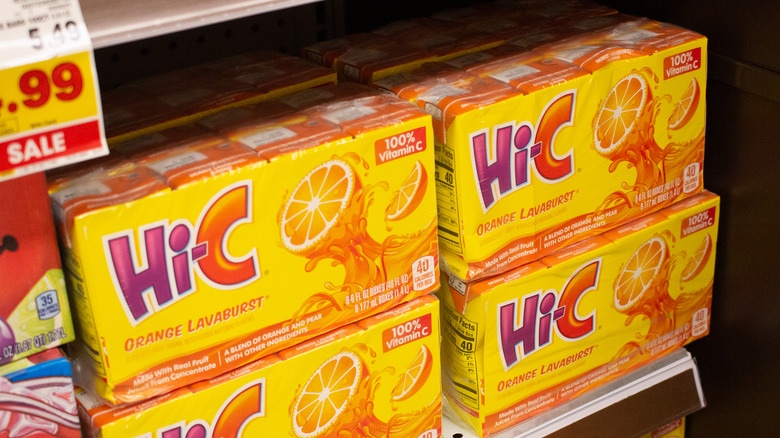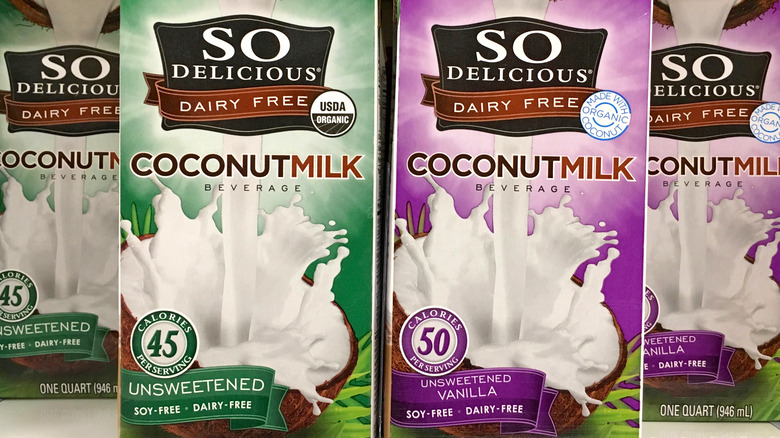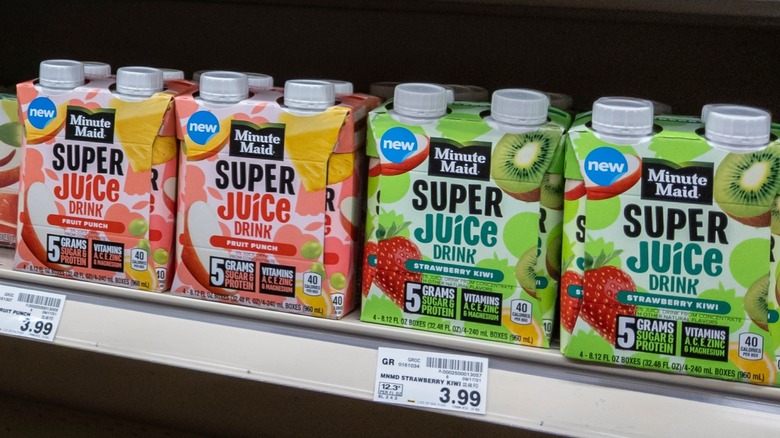Why Maine Once Banned The Sale Of Juice Boxes
For many adults, juice boxes summon memories of elementary school lunches and zoo field trips. It's easy to picture the little straw wrapped in plastic, glued to the side of the box, and using the sharp end to pierce the aluminum opening. Unless you have young children, those small juice boxes are probably a thing of the past. Perhaps now you buy larger drink boxes in similar packaging, like non-dairy milk or coconut water.
On the surface, these containers seem harmless. Many people assume they're recyclable because, well, many of the packages say they're recyclable, but there's some fine print to consider with the word "recyclable." Recycling these containers -– known as aseptic containers (via Waste 360) -– isn't as easy as tossing them in a bin with your other household recyclable items and waiting for them to be hauled away.
Because of this, juice boxes and other aseptic containers have caused some concerns in certain areas, including the state of Maine. Maine actually banned the sale of aseptic containers in 1990 amid these concerns, as reported by the Los Angeles Times.
What exactly are aseptic containers, and how are they recycled?
Aseptic containers are sterilized packages that are manufactured to prevent microorganisms from penetrating them, according to the U.S. Department of Agriculture. These containers have risen in popularity over the past few decades due to the benefits they provide for both consumers and merchants, but with these benefits come some potential dangers (per Encyclopedia.com).
Aseptic packaging involves multiple layers of raw materials, according to Eagle Flexible Packaging. For juice box containers, these materials include paper, plastic, and aluminum foil (per Aseptic Packaging Council via Pollution Prevention Infohouse). These items are all recyclable, generally speaking, but that doesn't mean that all paper, plastic, and aluminum foil items can be recycled or that all packages containing all three materials can be recycled.
Here's why: Juice boxes can be recycled only with a hydrapulper, a machine that removes plastic, aluminum, and other materials from plastic using water as well as an agitator (via Earth 911). Using water and an agitator, the hydrapulper then breaks the paper down until it becomes soft and pulpy –- hence the name of the machine. This paper pulp can then be recycled into tissue and other soft paper items.
Juice boxes can't be recycled at every recycling facility
Although hydrapulping is a pretty ingenious process, it's not available at every recycling facility (via Carton Council), which means juice boxes can't be recycled at every recycling facility. Along with many other items, when juice boxes end up at a facility that doesn't offer the appropriate process, it means they could end up getting trashed (via Recycle Nation). This landfill concern is what prompted the state of Maine to ban the sale of aseptic containers (via the Los Angeles Times).
According to the popular California newspaper, "The Legislature has outlawed it because the bonded layers of plastic, paper, and aluminum that keep the contents fresh defy recycling." It also added that juice boxes and other aseptic containers replace containers that can be easily recycled (without the need for hydrapulping).
Tetra Pak Inc., the company that created aseptic containers, defended the packaging by telling the Los Angeles Times that they're safe for the environment due to their small size and light weight, but they were banned statewide anyway.
The ban lasted for four years before being lifted, reported Supermarket News. When juice boxes returned to store shelves in 1994, consumers were provided with more information on aseptic packaging. The concerns that led to the ban contributed, in part, to the formation of the Carton Council in 2009, an organization aimed at increasing aseptic container recycling capabilities in the U.S. (via NPR).


